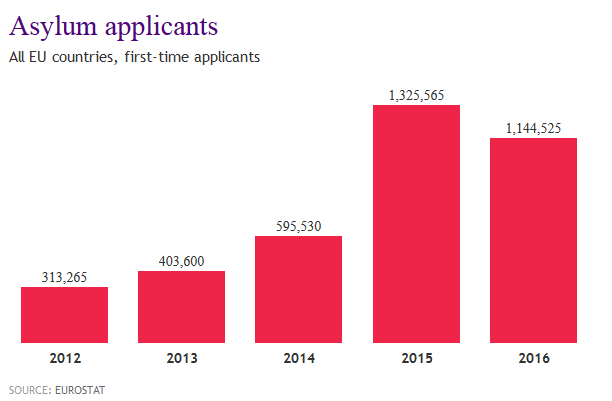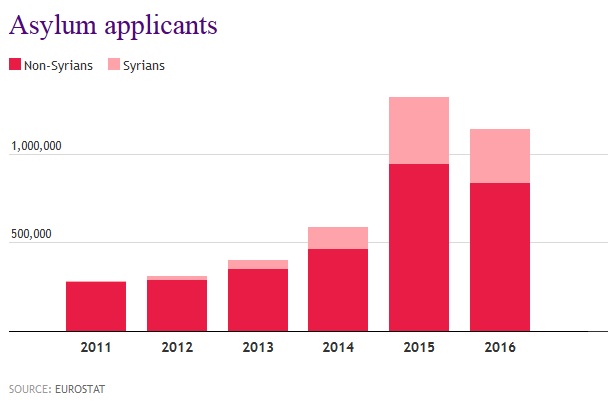The claim
“If you allow large numbers of people in – like Mrs Merkel did – what you find is that most people aren’t refugees, they’re young males, effectively economic migrants.” – Nigel Farage, February 24 2017
The background
Readers have pointed us in the direction of these words, spoken by former Ukip leader Nigel Farage at the US CPAC conference last week.
Mr Farage was talking about immigration into Europe, and called German Chancellor Angela Merkel’s decision to publicly welcome refugees to Germany “the biggest foreign policy mistake any Western leader has made since 1945”.
He went to say that the Islamic State group had promised to hide terrorists among the migrants and refugees heading to Europe from the Middle East, adding: “We ought to take that seriously.”
Mr Farage repeated a claim he and others have made many times in the past in one variation or another – that most of the large numbers of people seeking refuge in Europe in recent years are economic migrants rather than genuine refugees. Is that true?
The analysis
The terminology can be tricky in this debate. The words “migrants”, “refugees” and “asylum seekers” are sometimes used interchangeably, although they mean different things.
The UN defines a refugee as someone fleeing conflict or persecution. An asylum seeker is someone applying for the legal right to stay in another country because they fear of harm or persecution, but whose case hasn’t been decided.
It’s impossible to know for sure how many people who claim to be refugees are really economic migrants instead.
But we can find out how many people seeking asylum in EU states are rejected by the authorities, for whatever reason. And we know how many are young men.
The EU statistics agency Eurostat publishes regular figures on this. We’ll look at the annual statistics from 2010, the year before the Syrian Civil War broke out. Unfortunately the total for 2016 is incomplete, so this will be an underestimate.
The first obvious point is that there really has been a major increase in asylum applications to EU countries from outside the bloc, as has been widely reported. A record 1.3 million came in 2015, more than double the number in the previous year:

Interestingly, as we noted in previous FactChecks, some but not all of the increase can be accounted for by Syrians fleeing the conflict:

How many are “young men”? Let’s zero in on males aged 18-34, the kind of age group we imagine Mr Farage has in mind.
The percentage of young adult men among asylum seekers stayed pretty flat from 2010 to 2016, hovering around the 40 per cent mark:

Since total claimants shot up in 2015 and 2016 in particular, this still means that large numbers of young working-age men have come to Europe to seek asylum – more than half a million in 2015 alone.
How many were “not refugees”? We can filter out the people whose asylum applications were rejected, although this doesn’t prove beyond all doubt that all those people were economic migrants.
Here we see a big change. The percentage of people (of both sexes and all ages) whose asylum claims were rejected has dropped dramatically in recent years, almost halving between 2011 and 2016:

So in 2016, it’s not true to say that “most people aren’t (real)” refugees. There has been a big change in the percentage of people whose cases are found to be genuine.
An obvious question remains: are the young working-age men more likely to have an asylum claim rejected than the average person?
The answer to that is yes – slightly. But there is a similar downward trend in rejections:

A young adult male was much less likely to have an asylum claim rejected in 2016 than in 2011, and most were not rejected at first instance.
The verdict
On the latest figures, Mr Farage is wrong to suggest that “most” people who claim to be refugees are really found to be economic migrants.
He’s also potentially wrong to suggest that most asylum seekers are young males looking for work, although he didn’t define what he meant by “young”.
If he had said that large numbers of migrants – hundreds of thousands a year – have their asylum claims rejected, he would have been right.
And it would have been accurate to say that large numbers of young working-age men are coming to Europe to claim asylum.
This blog was updated on 3 March 2017 to reflect updated statistics for 2016.



